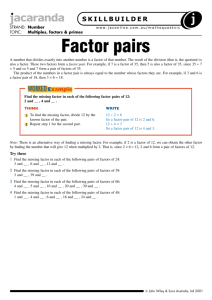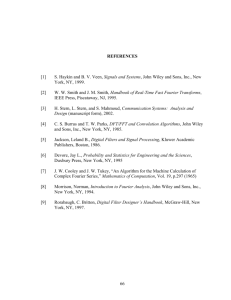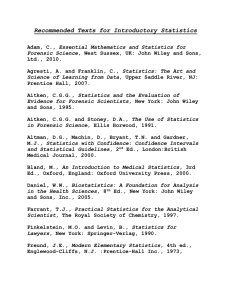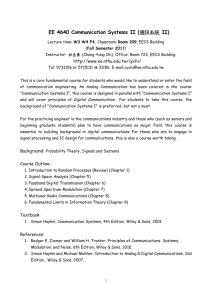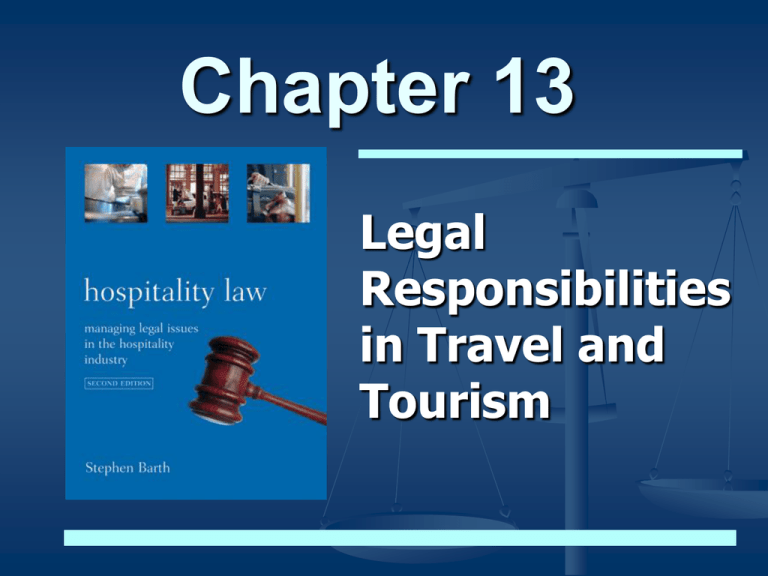
Chapter 13
Legal
Responsibilities
in Travel and
Tourism
Legal Responsibilities in Travel
and Tourism
Travel
Regulatory Interaction and Oversight
Travel Agents and Tour Operators
Transportation and Common Carriers
Tourism
Online Travel Sales
© 2005 Stephen C. Barth P.C. and John Wiley & Sons, Inc.
All Rights Reserved
In This Chapter, You Will Learn:
1.
2.
3.
To recognize those national and international
agencies and departments charged with
monitoring and regulating the travel industry.
To understand fully the roles and potential
liabilities of travel agents and tour operators as
each fulfills its unique role in marketing and
providing travel services.
To identify those common carriers typically utilized
by the travel industry, as well as the recurrent
areas of potential liability inherent in each of
them.
© 2005 Stephen C. Barth P.C. and John Wiley & Sons, Inc.
All Rights Reserved
In This Chapter, You Will Learn:
4.
5.
To evaluate tourism as it relates to gaming,
resorts and time-shares, and theme park
operations, based, in part, upon the unique
liability issues and managerial responsibilities
inherent in each of these growing areas.
How, from a legal perspective, the unique
characteristics of the Internet can impact
restaurant and hotel managers’ efforts to
integrate the power of the Web into their own
operations.
© 2005 Stephen C. Barth P.C. and John Wiley & Sons, Inc.
All Rights Reserved
Travel
Legalese:
Travel Law – The laws regulating business
and individual behavior in the travel
industry.
© 2005 Stephen C. Barth P.C. and John Wiley & Sons, Inc.
All Rights Reserved
Travel
Legalese:
International Travel Law – The ordinances,
rules, treaties, and agreements used to
regulate the international travel industry.
© 2005 Stephen C. Barth P.C. and John Wiley & Sons, Inc.
All Rights Reserved
Five key components of the
Travel Industry
1.
2.
3.
4.
5.
Preplanning Services
Transportation
Lodging
Food Services
Attractions and Activities
© 2005 Stephen C. Barth P.C. and John Wiley & Sons, Inc.
All Rights Reserved
Search the Web 13.1
Despite the popularity of the Internet as a way to
“plan your own” travel, the services of
professional travel agents continue to be in high
demand. To view the Web site of the largest of
the travel agent associations, go to
www.astanet.com. This is the Web site of the
American Society of Travel Agents (ASTA). When
you arrive, click on News, then Press Kit to read
about the goals of this effective organization.
© 2005 Stephen C. Barth P.C. and John Wiley & Sons, Inc.
All Rights Reserved
Search the Web 13.2
Founded in 1941, the Travel Industry Association
of America (TIA) is a Washington, DC-based
nonprofit association that is recognized as the
best source of research, analysis, and
forecasting for the travel industry. Its goal is to
make the United States the world’s most popular
travel destination. To view its Web site, go to
www.tia.org. When you arrive at the site, click
on About TIA to read about its goals and
activities.
© 2005 Stephen C. Barth P.C. and John Wiley & Sons, Inc.
All Rights Reserved
Travel
Legalese:
Jurisdiction – The authority given by law or
treaty to a court to try cases and make
decisions about legal matters within a
particular geographic area and/or over
certain types of cases.
© 2005 Stephen C. Barth P.C. and John Wiley & Sons, Inc.
All Rights Reserved
Regulatory Interaction and
Oversight
U.S. Government Agencies regulating the travel
industry:
Federal Trade Commission (FTC)
Centers for Disease Control (CDC)
Department of the Interior (DOI)
Department of State
Department of Homeland Security (DHS)
Treasury Department
Department of Transportation (DOT)
Tourism Policy Council (TPC)
© 2005 Stephen C. Barth P.C. and John Wiley & Sons, Inc.
All Rights Reserved
Search the Web 13.3
One of the most popular services offered by
the CDC is its “Travelers’ Health” information. It
is available online and seeks to inform travelers
about the health risks they may encounter when
traveling in various parts of the world. To view a
sample of the information provided, go to
www.cdc/gov/travel. When you arrive, click
on Choose a Region, under the heading
Destinations, to find out about the health risks
you might encounter in an area of the world you
would someday like to visit.
© 2005 Stephen C. Barth P.C. and John Wiley & Sons, Inc.
All Rights Reserved
Analyze the Situation 13.1
An elderly couple from Canada,
traveling in Central/South America, goes on a
shopping trip to a local produce market where
they buy and consume some locally grown
fruit. Upon returning, that evening to the
international hotel in the area, which you
manage, the husband falls ill and his wife
calls your front desk seeking assistance.
© 2005 Stephen C. Barth P.C. and John Wiley & Sons, Inc.
All Rights Reserved
Analyze the Situation 13.1
1.
2.
3.
What is the likely cause of the man’s
illness?
Based upon what you know about
reasonable care for guests, what action
would you expect your management team
to take relative to the man’s illness?
What would your position be if your hotel
was later sued by the couple, claiming you
had failed to warn them of local health
risks?
© 2005 Stephen C. Barth P.C. and John Wiley & Sons, Inc.
All Rights Reserved
Search the Web 13.4
The National Parks Service is in the
tourism business. To view its Web site,
where visitors can book tours, go to
www.reservations.nps.gov
© 2005 Stephen C. Barth P.C. and John Wiley & Sons, Inc.
All Rights Reserved
Search the Web 13.5
An important service provided by the
Department of State is that of issued travel
advisories and warnings to Americans
planning to travel outside the United States.
Travelers can access these warnings at
travel.state.gov/travel_warnings.html
© 2005 Stephen C. Barth P.C. and John Wiley & Sons, Inc.
All Rights Reserved
Analyze the Situation 13.2
Ted Flood had a reservation at the
Sleep Right hotel for the night of Oct. 15.
According to the reservation policy
explained to Mr. Flood at the time he
reserved the room from Sleep Right’s
national reservation system, the
nonguaranteed reservation was to be held
until 4:00 p.m. the afternoon of Mr.
Flood’s arrival.
© 2005 Stephen C. Barth P.C. and John Wiley & Sons, Inc.
All Rights Reserved
Analyze the Situation 13.2
Unfortunately, Mr. Flood’s flight to the city
where the Sleep Right was located was delayed,
because Mr. Flood’s plane had to spend four
hours on the airport runway because of
mechanical difficulties. Mr. Flood was unable to
contact the hotel and, as a result, his room was
released by the hotel at 4:30 p.m. and sold to
another guest at 5:00 p.m. Consequently, the
hotel had no rooms available when Mr. Flood,
tired and frustrated, arrived at the front desk at
8:00 p.m.
© 2005 Stephen C. Barth P.C. and John Wiley & Sons, Inc.
All Rights Reserved
Analyze the Situation 13.2
1.
2.
3.
What could Mr. Flood have done to avoid
his difficulty?
What responsibility, if any, does the hotel
now have to Mr. Flood?
What role did the FAA likely play in this
situation?
© 2005 Stephen C. Barth P.C. and John Wiley & Sons, Inc.
All Rights Reserved
Regulatory Interaction and
Oversight
International Organizations
World Tourism Organization (WTO)
International Civil Aviation Organization
(ICAO)
World Health Organization (WHO)
© 2005 Stephen C. Barth P.C. and John Wiley & Sons, Inc.
All Rights Reserved
Travel Agents and Tour Operators
Legalese:
Fiduciary – A relationship based on trust and
the responsibility to act in the best interest
of another when performing tasks.
© 2005 Stephen C. Barth P.C. and John Wiley & Sons, Inc.
All Rights Reserved
Potential Liability Issues for
Travel Agents
1.
2.
3.
4.
5.
Failure to provide promised services.
Failure to honor agreed-upon pricing.
Misrepresentation.
Failure to discover and disclose.
Negligence.
© 2005 Stephen C. Barth P.C. and John Wiley & Sons, Inc.
All Rights Reserved
Travel Agents
Legalese:
Class Action Lawsuit – A lawsuit filed by one
or more people on behalf of themselves
and a larger group of people who were
similarly affected by an event.
© 2005 Stephen C. Barth P.C. and John Wiley & Sons, Inc.
All Rights Reserved
Search the Web 13.7
1.
2.
3.
The world’s oldest travel agency is the Thomas
Cook Agency. Log on to the Internet and enter
www.thomascook.com.
When you arrive, click on Here, under Corporate
Web site.
Next select About Us.
Finally, click Short History to read about Cook’s
international operations and development
© 2005 Stephen C. Barth P.C. and John Wiley & Sons, Inc.
All Rights Reserved
Tour Operators
Legalese:
Tour Operator – A company whose primary
activity is the planning, packaging, and
marketing of travel services, including
transportation, meals, accommodations,
and activities.
© 2005 Stephen C. Barth P.C. and John Wiley & Sons, Inc.
All Rights Reserved
Potential Liability Issues for Tour
Operators
1.
2.
3.
4.
5.
Nonpayment for prearranged services.
Nondelivery of promised services.
Adhesion contracts.
Liability for injury or accident.
Misrepresentation.
© 2005 Stephen C. Barth P.C. and John Wiley & Sons, Inc.
All Rights Reserved
Tour Operators
Legalese:
Adhesion contract – A contract whose terms
were not truly negotiated or bargained
and, as a result, may be so one-sided in
favor of the stronger party that the
contract is often deemed unenforceable by
the courts.
© 2005 Stephen C. Barth P.C. and John Wiley & Sons, Inc.
All Rights Reserved
Search the Web 13.8
1.
2.
3.
The National Tour Association (NTA)
monitors travel law related to tour
operators. Log on to the Internet and
enter www.ntaonline.com
When you arrive, click on Government
Relations.
Next select Sellers of Travel laws.
Read the Travel Sellers law in the state
that is closest to you.
© 2005 Stephen C. Barth P.C. and John Wiley & Sons, Inc.
All Rights Reserved
Analyze the Situation 13.3
As part of a 3-day “Mystery Tour”, Joan
Larson of Apex Travel, Inc., a Wisconsinbased tour operator, contacted the Ragin
Cajun restaurant in Illinois, for the purpose of
reserving 120 seats for dinner on a Friday
night in September. The tour group arrived,
and one male group member, after three
drinks, began making rude and suggestive
comments to one of the restaurant’s female
servers.
© 2005 Stephen C. Barth P.C. and John Wiley & Sons, Inc.
All Rights Reserved
Analyze the Situation 13.3
When Steve, the restaurant manager
approached Gene, the Apex tour leader,
about the situation, Gene maintained the
comments were probably made in harmless
fun and should be overlooked by the
restaurant. “Besides”, state Gene, “our bus is
leaving to go back to our hotel in one hour
and that particular tour group member lives
several hundred miles away and is unlikely to
ever see that server again”.
© 2005 Stephen C. Barth P.C. and John Wiley & Sons, Inc.
All Rights Reserved
Analyze the Situation 13.3
As the Ragin Cajun’s restaurant manager:
1. What are your legal responsibilities to
your server?
2. Who is responsible for controlling this
guest’s behavior?
3. How would you respond to Gene, the
tour operator?
4. What potential liability does Apex face in
this situation?
© 2005 Stephen C. Barth P.C. and John Wiley & Sons, Inc.
All Rights Reserved
Transportation and Common
Carriers
Legalese:
Common Carrier – A company or individual
that is in the regular business of
transporting people and/or freight for a
fee. Examples include airlines, cruise lines,
trains and buses.
© 2005 Stephen C. Barth P.C. and John Wiley & Sons, Inc.
All Rights Reserved
Transportation and Common
Carriers
Legalese:
Tariff – The agreement between an airline
and its passengers. When purchasing a
ticket, the passenger agrees to the terms
of the tariff.
© 2005 Stephen C. Barth P.C. and John Wiley & Sons, Inc.
All Rights Reserved
The Transportation Industry
Airlines
Trains
Cruise Ships
Buses
Car rentals
© 2005 Stephen C. Barth P.C. and John Wiley & Sons, Inc.
All Rights Reserved
Transportation and Common
Carriers
Legalese:
Warsaw Convention – Short for the Convention
for the Unification of Certain Rules Relating to
International Carriage by Air, signed at Warsaw
on October 12, 1929, this agreement set limits
on the liabilities of airlines that follow
established guidelines for the safe operation of
international airline flights.
© 2005 Stephen C. Barth P.C. and John Wiley & Sons, Inc.
All Rights Reserved
Transportation and Common
Carriers
Legalese:
Signatory – An entity that signs and agrees
to abide by the terms of a document.
© 2005 Stephen C. Barth P.C. and John Wiley & Sons, Inc.
All Rights Reserved
Search the Web 13.9
1.
2.
3.
Rail travel takes longer than air travel, but
passenger fares, in some cases, make it more
cost-effective. Log on to the Internet and enter
www.amtrak.com
At the site, price a passenger fare between
New York City and Chicago.
Now price the same trip by airplane on
www.Travelocity.com
Compare the travel time involved with the fare
savings. To whom do you believe train travel
would be most appealing?
© 2005 Stephen C. Barth P.C. and John Wiley & Sons, Inc.
All Rights Reserved
Transportation and Common
Carriers
Legalese:
Maritime Law – Also called “admiralty law”
or “the law of admiralty”, the laws,
regulations, international agreements, and
treaties that govern activities in navigable
waters.
© 2005 Stephen C. Barth P.C. and John Wiley & Sons, Inc.
All Rights Reserved
Potential Liability Issues for the
Transportation Industry
1.
2.
3.
4.
5.
Legal jurisdiction.
Overbooking.
Responsibility for baggage.
Unplanned changes in itinerary.
Industry-specific issues.
© 2005 Stephen C. Barth P.C. and John Wiley & Sons, Inc.
All Rights Reserved
Tourism
Legalese:
Time-share – A form of shared property
ownership in which a buyer acquires the
right to occupy a piece of real estate, such
as a condominium in a resort area, for a
specific period of time each year.
© 2005 Stephen C. Barth P.C. and John Wiley & Sons, Inc.
All Rights Reserved
Tourism
Legalese:
Amusement Park – An entertainment facility
featuring rides, games, food, and sometimes
shows. Theme parks are amusement parks in
which the rides, attractions, shows, and
buildings revolve around a central theme or
group of themes. Examples include the Disney
and Universal Studies owned amusement
parks.
© 2005 Stephen C. Barth P.C. and John Wiley & Sons, Inc.
All Rights Reserved
Tourism
Legalese:
Gaming – Legalized gambling.
© 2005 Stephen C. Barth P.C. and John Wiley & Sons, Inc.
All Rights Reserved
Potential Liability Issues for
Gaming Operations
1.
2.
3.
Economic and Environmental impact of
resorts and resort activities.
Deceptive sales tactics.
Rights in event of default.
© 2005 Stephen C. Barth P.C. and John Wiley & Sons, Inc.
All Rights Reserved
Search the Web 13.10
Log on to the Internet and enter
www.nagra.com
1. At the site, click on About NAGRA.
2. Next, click on Vision and Goals.
3. Why would standardization among
regulations be important for the
continued development of the gaming
industry?
© 2005 Stephen C. Barth P.C. and John Wiley & Sons, Inc.
All Rights Reserved
Search the Web 13.11
1.
2.
3.
The time-share industry has been helped
tremendously by the entrance of large and
well-established hotel companies seeking to
promote the resorts they own and operate.
Log on to the Internet and enter
www.hiltongrandvacations.com
Click on Discover Ownership.
Click on How It Works.
Do you believe Hilton does a good job
explaining the advantages and limitations of a
time-share purchase?
© 2005 Stephen C. Barth P.C. and John Wiley & Sons, Inc.
All Rights Reserved
Tourism
Legalese:
Nondisturbance clause – A clause in a
contract that stipulates that leases or other
ownership investments in the property will
be allowed to continue uninterrupted in the
event of a default or insolvency by the
landlord/seller.
© 2005 Stephen C. Barth P.C. and John Wiley & Sons, Inc.
All Rights Reserved
Potential Liability Issues for
Amusement Parks
1.
2.
3.
Safety of activities.
Performance expectations.
Litigation related to employee training.
© 2005 Stephen C. Barth P.C. and John Wiley & Sons, Inc.
All Rights Reserved
Analyze the Situation 13.4
Sandra Wilkens was a roller-coaster
enthusiast who, along with others, attended the
Harley Amusement park’s “Roller Fest”, a POP
(pay one price) event featuring unlimited rollercoaster riding by all attendees. Sandra, 25 years
old, paid the $50 admission fee and was, at the
time of her fatal accident, riding the Superman,
a wooden double-loop coaster. On the final loop,
Sandra was thrown from the coaster and killed.
Witnesses say she was standing in the coaster
car as it approached the final loop.
© 2005 Stephen C. Barth P.C. and John Wiley & Sons, Inc.
All Rights Reserved
Analyze the Situation 13.4
Sandra’s family filed suit against the park
and its state ride inspectors, claiming negligence
because Sandra was placed in a car where she
had the ability to stand up. Park officials
countered that all riders were informed, via a
public address system, not to stand during the
ride’s operation. In addition, they pointed to
posted signs that warned riders not to stand up
during the entire length of the ride.
© 2005 Stephen C. Barth P.C. and John Wiley & Sons, Inc.
All Rights Reserved
Analyze the Situation 13.4
Further, they said, the ride was operating
properly, all rider restraints had been inspected
and approved that morning, and Sandra had
taken inadvisable action to defeat the restraining
devices built into the ride.
© 2005 Stephen C. Barth P.C. and John Wiley & Sons, Inc.
All Rights Reserved
Analyze the Situation 13.4
1.
2.
3.
What level of responsibility should the park
operators be assigned for Sandra’s behavior?
List five specific actions the park management
could take or institute to help eliminate such
guest behavior in the future.
What similar situations might you face in your
own area of hospitality where responsibility for
guest injury may be all or partially related to
guest behavior?
© 2005 Stephen C. Barth P.C. and John Wiley & Sons, Inc.
All Rights Reserved
Search the Web 13.12
1.
2.
3.
4.
E-commerce sites, by definition, must allow
consumers to buy while at the sites. PayPal is one
example of a credit-card processing company required
to allow such purchasinig. Log on to the Internet and
enter www.paypal.com
When you arrive, click on Merchant Tools.
Next, review the Buy Now and Shopping Cart options.
Describe the differences between these two options.
Which do you believe would be the best choice for a
business in the hospitality industry?
© 2005 Stephen C. Barth P.C. and John Wiley & Sons, Inc.
All Rights Reserved
Online Travel Sales
Legalese:
Global Distribution System (GDS) – An
interconnected computer system that
connects travel professionals worldwide to
those companies selling travel services.
© 2005 Stephen C. Barth P.C. and John Wiley & Sons, Inc.
All Rights Reserved
Legal Issues Related to Online
Travel Sales
1.
2.
3.
4.
5.
Parties to the contract.
Data interface issues.
Data security/ownership issues.
Forum (venue) selection issues.
Lawful advertising.
© 2005 Stephen C. Barth P.C. and John Wiley & Sons, Inc.
All Rights Reserved
Search the Web 13.13
Hospitality managers and service providers seeking
to offer consumers the ability to reserve online
can choose from a variety of options. Log on
to the Internet and enter.
www.webervations.com
1.
When you arrive, click on Online Reservations.
2.
Describe the differences between a
“reservation request” and a “real time
reservation”.
3.
Why would a hotel manager elect to choose
one or the other?
© 2005 Stephen C. Barth P.C. and John Wiley & Sons, Inc.
All Rights Reserved
What Would You Do?
You are the manager of a franchised, 90-room
limited-service hotel property located across the
highway from 7 Flags. One of the most popular
packages your hotel sells includes a two-night stay (in
on Friday, out on Sunday morning), complimentary
breakfast, and tickets to 7 Flags. You purchase the
tickets, in quantity, from the 7 Flags group sales
department. Your packages are marketed directly by
your hotel and sold through select travel agents to
whom you pay a sales commission.
© 2005 Stephen C. Barth P.C. and John Wiley & Sons, Inc.
All Rights Reserved
What Would You Do?
At 3:00 p.m. on a Saturday afternoon in July,
lightning from a severe summer thunderstorm strikes a
major electrical transformer in the area, causing an
area power outage that includes the amusement park
and results in the park’s immediate closure. Your hotel
is sold out. The power company is unsure how long it
will take to fully restore power, but its estimate is
hours, not minutes. Your own hotel has a backup
generator, thus essential hotel services such as
emergency lighting and power to the property
management system (PMS) are maintained.
© 2005 Stephen C. Barth P.C. and John Wiley & Sons, Inc.
All Rights Reserved
What Would You Do?
Your lobby, however, is filled with families seeking
to check out (it is 4:30 p.m.) so they can leave the
area and drive back to their homes (where most of
them will have power). Approximately 60 guests want
to check out. None of these guests believe they
should have to pay for their Saturday night stay
because, due to the power outage, they will not use
their reserved room. Some want a refund for Friday
night as well, claiming the hotel did not provide the
complete two-day “package” that was promised.
© 2005 Stephen C. Barth P.C. and John Wiley & Sons, Inc.
All Rights Reserved
What Would You Do?
1.
2.
3.
Would you bill these 60 guests for Saturday night’s
stay, even if they elect to leave?
Would you give the guests any other compensation?
Would your course of action be affected if you learned
the theme park had made the decision to refund the
price of admission to all those who entered the park
that day?
© 2005 Stephen C. Barth P.C. and John Wiley & Sons, Inc.
All Rights Reserved
What Would You Do?
1.
2.
If the theme park had made the refund
mentioned, do you believe the amount of the
refund belongs to the disappointed park
attendee or to your hotel?
Describe briefly how the decision you make
will affect:
1.
2.
3.
Your relationship with the theme park’s
management.
The relationship with your franchisor.
Your relationship with travel agents marketing
your package.
© 2005 Stephen C. Barth P.C. and John Wiley & Sons, Inc.
All Rights Reserved
Rapid Review
1.
2.
3.
4.
5.
Identify the five major components of the travel
industry.
Discuss the role of at least four of the eight federal
regulatory bodies examined in this chapter.
Define the roles of the WTO, the IACO, and the
WHO as they relate to travel.
Detail the legal relationship that exists between the
three parties when a travel agent sells to a client a
travel package marketed by a tour operator.
Specify at least two legal issues that would be
considered unique to the transportation industry.
© 2005 Stephen C. Barth P.C. and John Wiley & Sons, Inc.
All Rights Reserved
Rapid Review
6.
7.
8.
Tribal gaming is a controversial issue in many
communities. Prepare a list of five points explaining
your support for or opposition to its expansion.
Write a paragraph explaining why you might seek
employment in the gaming, resort, or amusement
park industries. What might be some disadvantages
of such employment?
The Internet is popular among travelers. Discuss your
view of how the Internet will impact the travel agent
and tour operator segments of the travel industry in
the coming years.
© 2005 Stephen C. Barth P.C. and John Wiley & Sons, Inc.
All Rights Reserved

